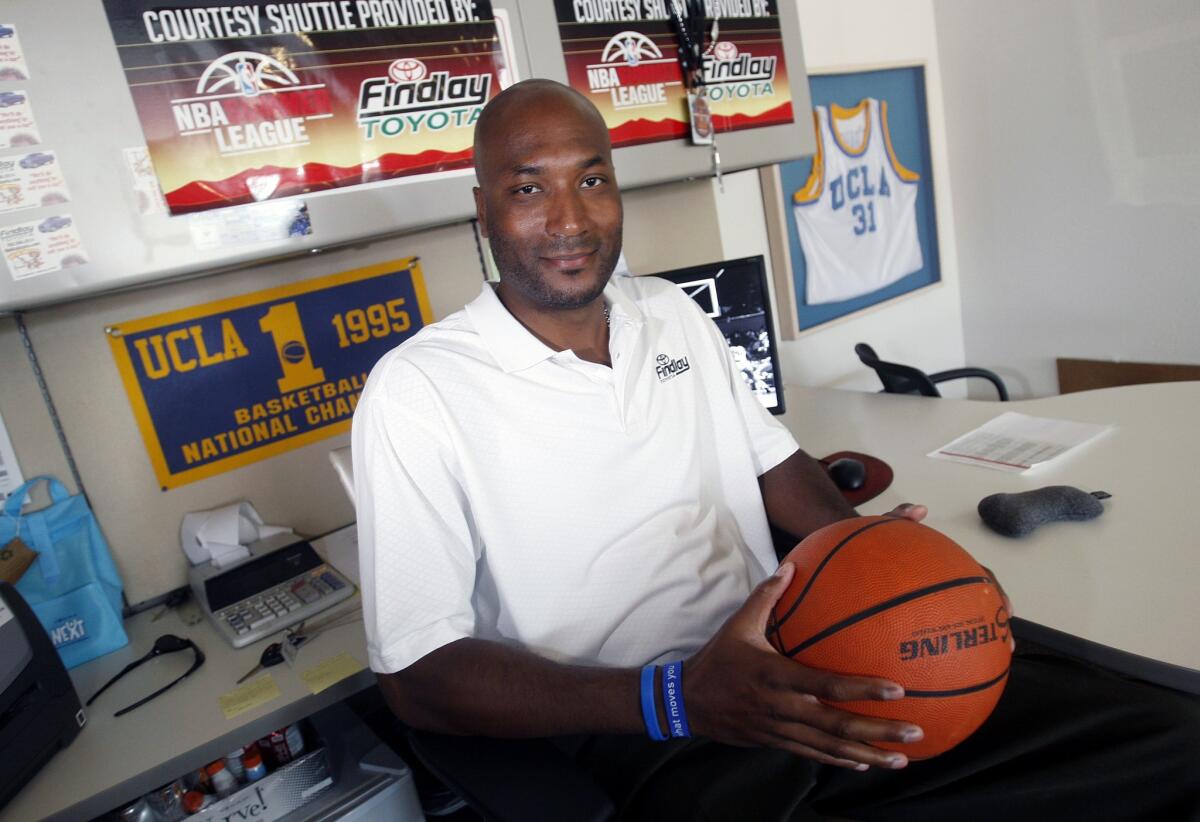Federal appeals court overturns ruling that would have paid college athletes

Former UCLA basketball player Ed O’Bannon Jr. sits in his office in Henderson, Nev., in 2010. O’Bannon spearheaded a lawsuit arguing that college athletes should get a portion of the billions in revenue that the NCAA generates through TV broadcasts and video games bearing the names, images and likenesses of players.
- Share via
College sports have long wrestled with an essential question: Should athletes — especially big-time football and basketball players whose games generate billions of dollars — be paid for their efforts?
A federal appeals court weighed in on the issue Wednesday, overturning a lower court’s ruling that athletes could get paid as much as $5,000 a year in deferred payments, above and beyond their scholarships.
At the same time, the 9th U.S. Circuit Court of Appeals upheld one part of the earlier ruling, which would allow NCAA member schools to offer scholarships that cover the full cost of attendance, and not only tuition, room, board, books and fees.
Get the latest in sports with our free newsletter >>
“It’s a victory for both sides,” said Michael Carrier, a law professor at Rutgers University who signed onto an amicus brief in the case. “And it’s not likely the last word on this subject.”
At the heart of the decision lay an antitrust lawsuit — brought by former UCLA basketball player Ed O’Bannon — that focused on money the NCAA generates through television broadcasts and video games bearing the names, images and likenesses of players.
The plaintiffs claimed that antitrust law entitled athletes to a cut of that money.
The NCAA had traditionally adhered to a strict view of amateurism, mandating that schools limit scholarships to the cost of tuition, room, board, books and fees — and not include such things as transportation and miscellaneous expenses.
College sports leaders had insisted an amateur image was crucial to preserving the nature of their games. They said their rules promoted competitive balance, preventing rich schools from buying all the best high school talent.
Last year, U.S. District Court Judge Claudia Wilken ruled otherwise, finding the NCAA’s practice of limiting scholarships in violation of the Sherman Antitrust Act. Wilken also devised the plan by which some players could be paid as much as $5,000 a year, with the money placed in a trust fund and given to them when they left school.
On Wednesday, the appellate judges drew a line down the middle.
“The Rule of Reason requires that the NCAA permit its schools to provide up to the cost of attendance to their student athletes,” the court wrote. “It does not require more.”
NCAA leaders had already shifted gears on the financial aid issue, allowing members to provide expanded scholarships that covered the expense of traveling to school and other personal costs. But, in court, they had also tried for a knockout blow, arguing on several fronts that college sports should remain exempt from antitrust law.
Their reaction to the appellate opinion was predictably less-than-enthusiastic.
While praising the judges for characterizing Wilken’s deferred-payment plan as “erroneous,” they questioned the decision on full-cost aid. “We disagree that it should be mandated by the courts,” NCAA President Mark Emmert said in a statement.
A coalition representing 31 of the largest conferences in college sports, including the Pac-12, expressed similar emotions.
“It’s important to remember that we’re talking about students, not employees,” the coalition said in a statement.
The plaintiff’s attorney called the decision a victory for athletes.
“The [9th] Circuit has affirmed that the NCAA and its member schools are a price-fixing cartel that has long violated the antitrust laws,” attorney Michael Hausfeld said.
Schools with limited athletic department budgets — those that have fought the added expense of full-cost scholarships — might be Wednesday’s biggest losers.
“The bottom line is, it’s going to be more expensive to have college teams across the board,” said Dan Eaton, a employment attorney and instructor at San Diego State. “That will affect the non-power conferences that don’t generate massive revenues.”
Either side in the O’Bannon case may now petition for another review before a larger panel of 9th Circuit judges or attempt to take the case to the Supreme Court. Legal experts wonder how the appellate decision might influence other lawsuits.
The NCAA recently dodged a bullet when the National Labor Relations Board declined to assert jurisdiction in a case that saw Northwestern football players attempt to unionize as school employees.
There are other suits in the pipeline, including consolidated cases that will come before Wilken in Northern California.
Current and former players will continue to test antitrust law as it relates to the NCAA, in some instances seeking to create a system by which blue-chip recruits could negotiate for market-value scholarships far beyond the cost of attending school.
The nature of the O’Bannon decision “does not immunize the amateurism rule from further attack,” said Dan Lazaroff, a professor emeritus at Loyola Law School.
With many skeptical about the true degree of amateurism in college sports, the legal system may yet rewrite the rules.
“I don’t foresee the end of this debate,” Lazaroff said. “It’s not over by a longshot.”
Follow David Wharton Twitter @LATimesWharton
ALSO
Counting scholarships in USC’s 2016 recruiting class
College football analyst Joel Klatt isn’t high on USC
After counseling, losing 25 pounds, Robert Upshaw says he’s ready
More to Read
Go beyond the scoreboard
Get the latest on L.A.'s teams in the daily Sports Report newsletter.
You may occasionally receive promotional content from the Los Angeles Times.











